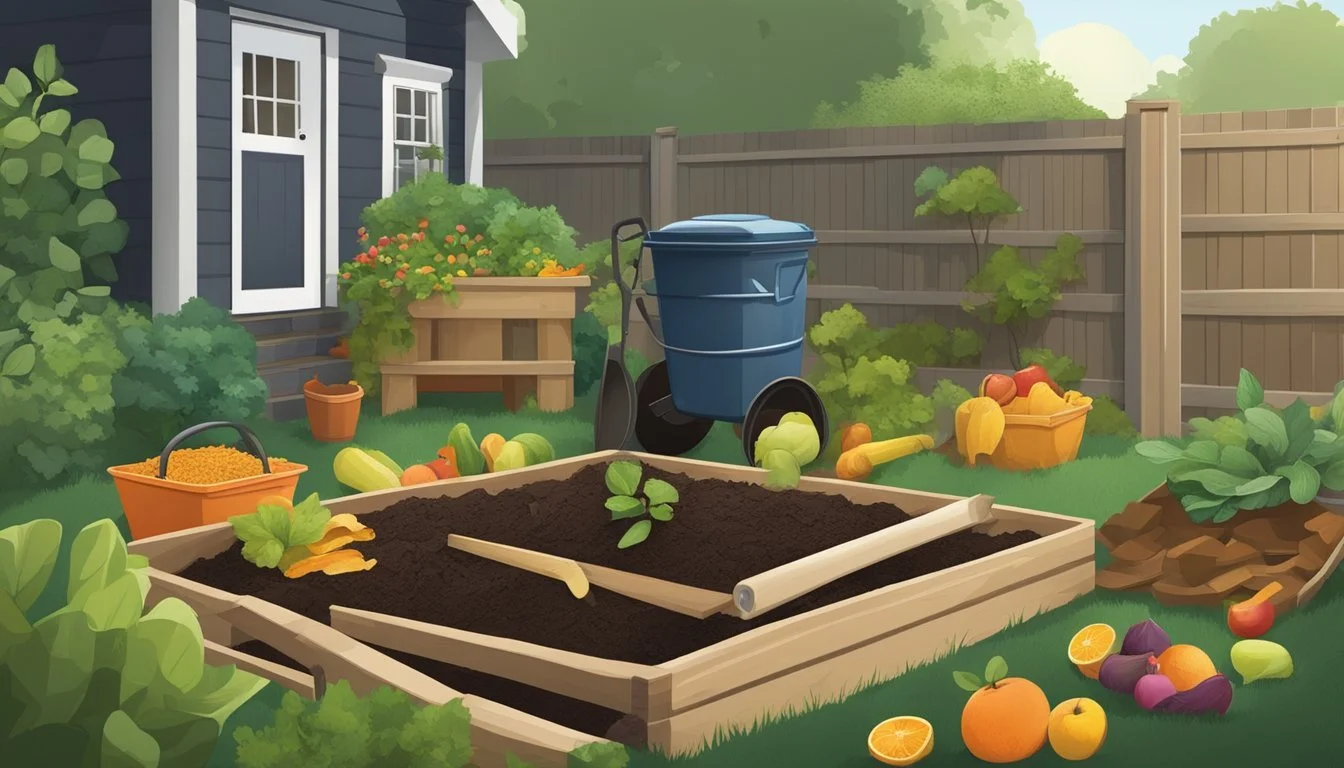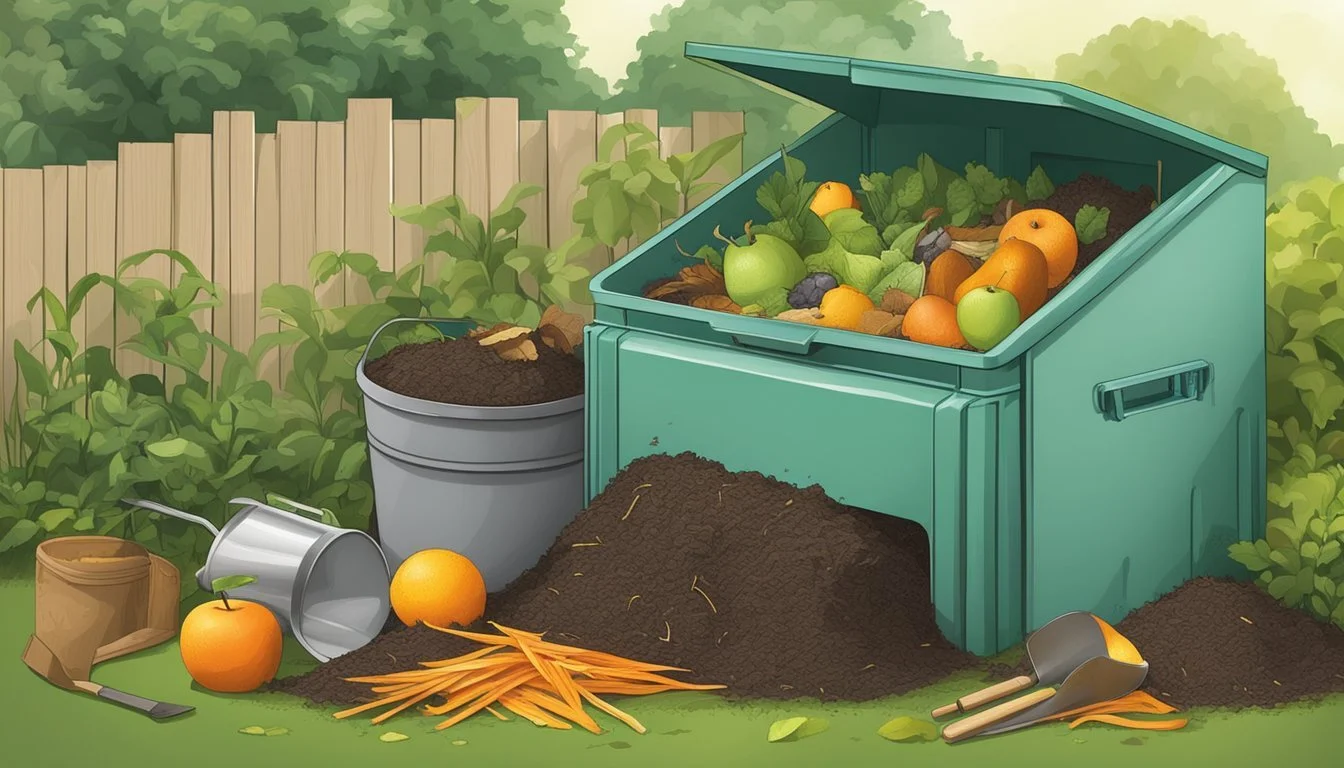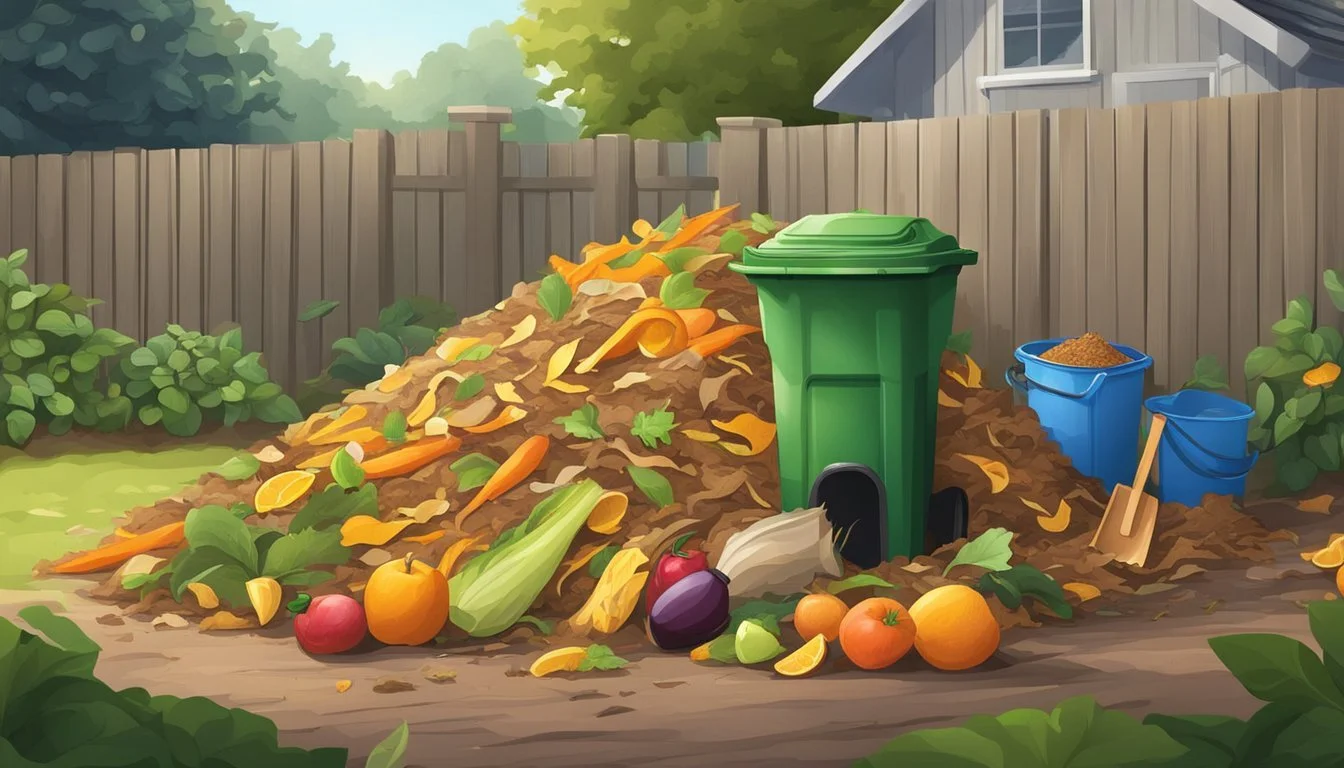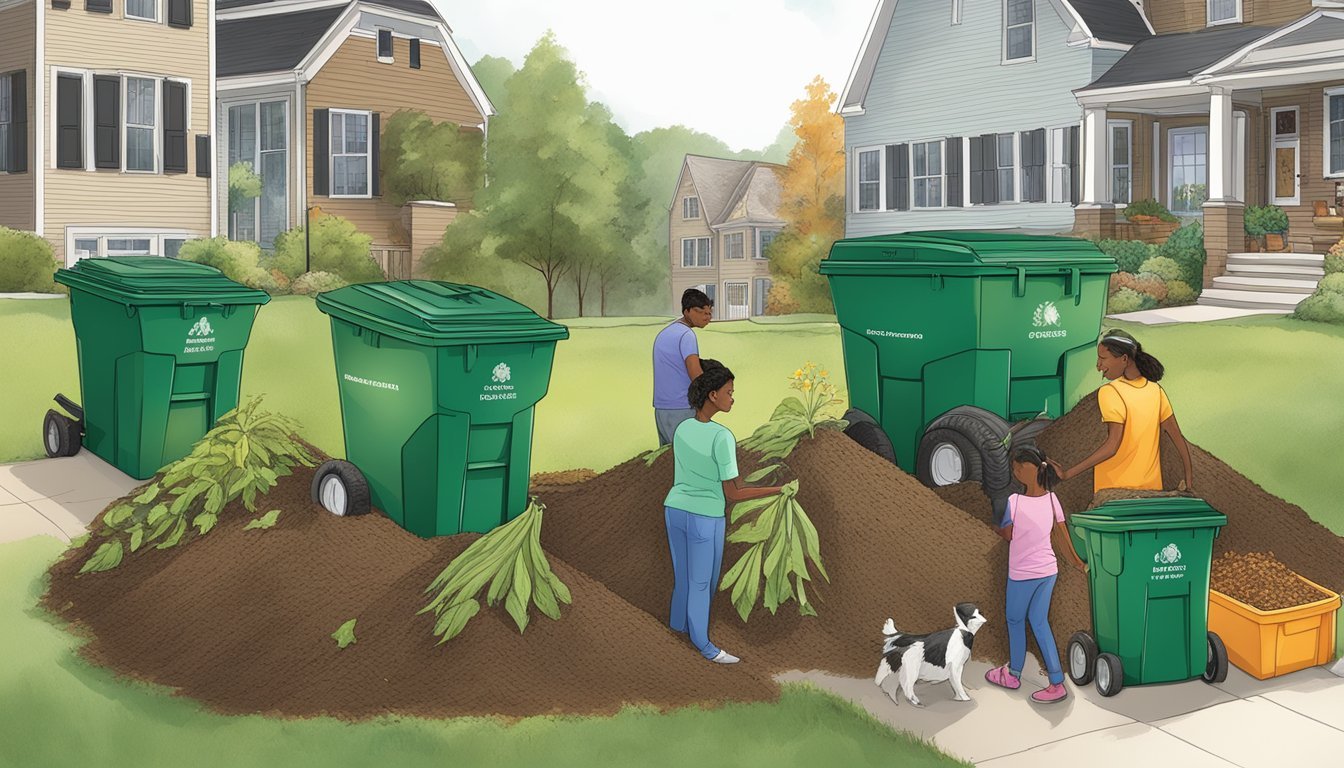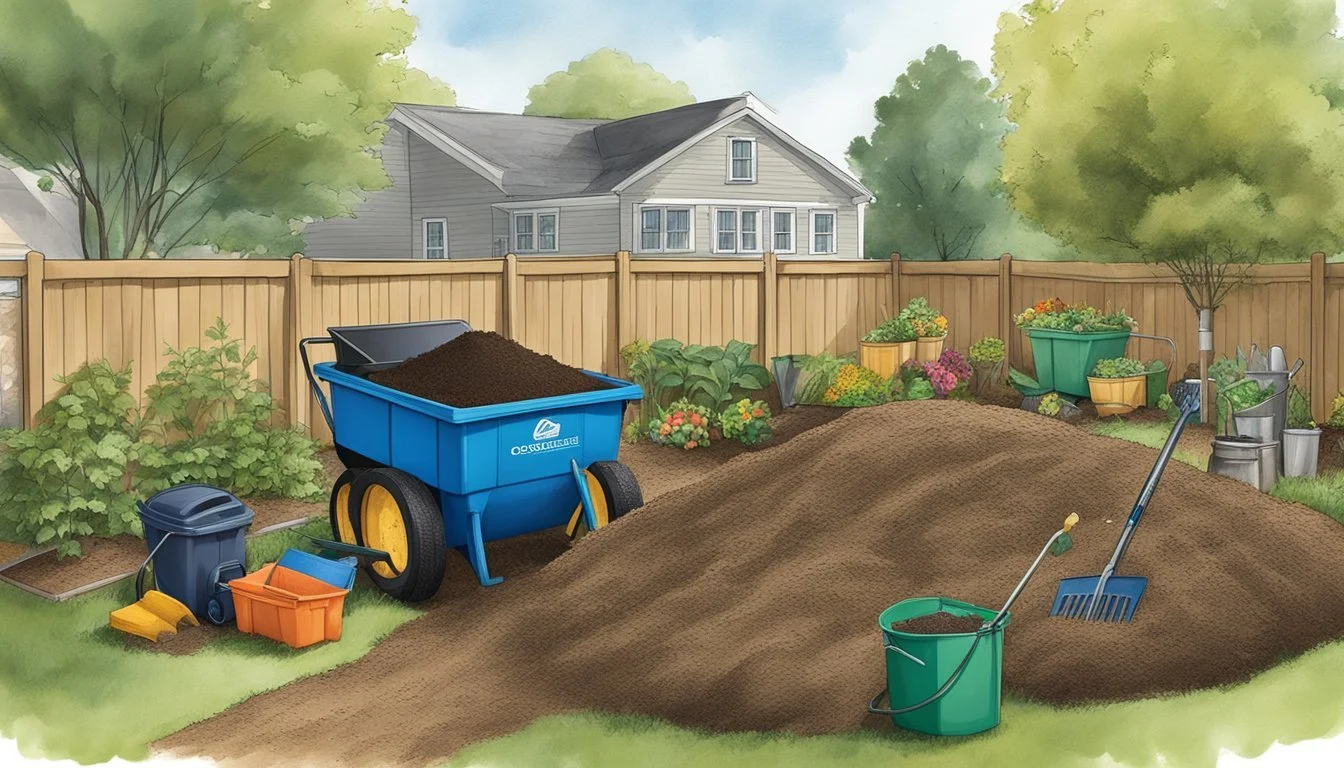Guide to Composting in Concord, NC
Essential Tips for Local Residents
Composting provides residents of Concord, NC with an opportunity to transform their kitchen scraps and yard waste into valuable soil amendments. The process not only enriches gardens but also plays a vital role in reducing the waste that ends up in landfills. In Concord, the local government encourages households to consider backyard composting as a means to improve their garden's health while saving tax dollars.
The City of Concord offers a range of services to support composting efforts, including weekly yard waste collection that fits into the regular schedule of refuse pickup. Through the integration of leaves, grass clippings, and plant material, along with kitchen scraps, homeowners can create an excellent compost mixture. This mixture can boost plant growth, improve soil fertility, and increase the nutrient content of the soils across different types of gardens and landscapes in the area.
Understanding the composting process is essential for effective practice. It is relatively simple and economically feasible for individuals to engage in, turning their organic waste into a resource rather than a burden. With education and community support, composting in Concord, NC can be a widespread environmental effort with significant positive impacts.
The Basics Of Composting
Composting is an essential process for converting organic waste into a valuable soil amendment. This section breaks down what compost is and explores its numerous benefits.
What Is Compost?
Compost is the end product of the decomposition process of organic matter which includes leaves, grass clippings, vegetable scraps, and other plant-based materials. Microorganisms, like bacteria and fungi, play a crucial role in breaking down this material in the presence of oxygen. To effectively compost, one needs a balance of these organic materials to create a nutrient-rich humus that significantly improves soil quality. Typically, composting is done in a dedicated composting bin, which helps to regulate the conditions necessary for efficient decomposition.
Greens (nitrogen-rich materials): Food scraps, coffee grounds, fresh grass clippings
Browns (carbon-rich materials): Dry leaves, branches, cardboard
Benefits Of Composting
Composting offers numerous advantages. Not only does it enrich the soil, helping retain moisture and suppress plant diseases, but it also reduces the need for chemical fertilizers. By converting organic waste into compost, they encourage the production of beneficial bacteria and fungi that break down organic material to create humus, a nutrient-filled material that feeds the soil. Additionally, composting decreases methane emissions from landfills and lowers an individual's carbon footprint, contributing to environmental sustainability.
Starting Your Compost In Concord
Embarking on the composting journey in Concord, NC, involves selecting a suitable site, choosing the right compost bin, and understanding how to balance green and brown materials effectively.
Choosing The Right Location
When starting a backyard composting system, it's crucial to choose a location that is convenient yet appropriate. The spot should be well-drained to avoid waterlogging, have partial shade to help manage temperature, and be accessible year-round for adding materials and maintenance. Keep it away from structures to avoid unwanted pests.
Selecting Your Compost Bin
One's choice of compost bin can be influenced by personal preference and the scale of composting desired. Residents may opt for a closed-bin system, which is more protected from pests and neat in appearance, or a simple wire mesh container, both of which can be suitable for processing yard waste and kitchen scraps. Concord residents can find more information on compost bins.
Balancing Green And Brown Materials
A successful compost pile requires a balance between green materials (kitchen scraps, grass clippings) which provide nitrogen, and brown materials (leaves, straw) which offer carbon. The optimal ratio is about 1 part green to 3 parts brown. This balance helps maintain the right level of moisture and ensures that the compost pile decomposes effectively without emitting a foul odor. Properly managed, a compost heap will convert yard waste into a nutrient-rich amendment for gardens and landscapes.
Materials To Compost
Composting in Concord, North Carolina, can be a highly effective way of recycling organic waste into nutrient-rich soil. Knowing what to add and what to avoid is crucial for a successful composting process.
Ideal Composting Ingredients
Composting thrives on a balance of carbon-rich and nitrogen-rich materials. The following leaves, grass clippings, and yard trimmings are ideal as they break down and enrich the compost mix:
Leaves: A good source of carbon, mulched leaves decompose faster.
Grass Clippings: Rich in nitrogen, they should be mixed in thin layers to prevent matting.
Food scraps: Including vegetables, fruits, coffee grounds, and eggshells; avoid meat, dairy products, and oily foods to prevent odor and pests.
Yard trimmings: Free of herbicide carryover, these can be added in moderation.
Hay: Dry or spoiled hay can be layered into the compost.
Grains and bread: In small amounts, they can be composted.
Flowers: Both fresh and dried flowers can be composted, but no diseased plants.
Other compostable items include:
Paper bags: Torn into small pieces for better decomposition.
Napkins: Unbleached and shredded.
Pizza boxes: Remove any greasy parts, then shred.
Cardboard: Must be broken down into small pieces.
Items To Avoid In Compost
Certain items can contaminate compost or attract pests. Avoid them to maintain a healthy composting system:
Animals Products: Meat, bones, and dairy products attract pests and create bad odors.
Grease and Oils: Can upset the balance of compost and attract pests.
Diseased Plants: May spread disease within the compost and to future plants.
Herbicide Carryover: Yard trimmings treated with herbicides can harm compost microbes and future plants.
Fish: Like meat and dairy, fish scraps can attract pests and smell unpleasant.
Composting is a simple yet specific process that requires careful consideration of what to include. By following the guidelines of what materials to compost, residents of Concord can create a beneficial compost while reducing waste.
Maintaining Your Compost Pile
Proper maintenance is crucial for converting organic materials into rich compost. This includes managing aeration and moisture, and monitoring temperature and pH levels. The use of tools like a shovel or digging fork is integral to this process.
Aeration And Moisture Control
Aeration is essential for maintaining a healthy compost pile. It encourages aerobic bacteria to thrive, which speeds up the composting process. One should turn the pile regularly using a shovel or a digging fork to introduce oxygen. The pile should be moist but not waterlogged, as excessive moisture can lead to anaerobic conditions and odor issues.
Frequency: Turn the pile every 1-2 weeks.
Moisture Check: The compost should feel like a wrung-out sponge.
Monitoring Temperature And PH Levels
The temperature of a compost pile is an indicator of microbial activity. Piles should be warm to the touch. If not, they may require more green material, moisture, or aeration.
Ideal Temperature: Aim for between 130°F - 150°F (55°C - 65°C).
The pH level influences the breakdown of materials. A neutral to slightly acidic pH is optimal for most composting operations. Adjustments can be made by adding more green or brown materials.
Target pH: Between 6.0 and 7.5 is ideal for composting.
One can use a compost thermometer and pH meter to monitor these parameters accurately. Maintaining the right balance is key for converting yard waste and food scraps into a valuable amendment for gardening in Concord, NC.
Using Finished Compost
Finished compost is a gardener's gold, transforming waste into a valuable resource that enhances plant growth and soil health. It acts as a multifaceted tool in the gardener's arsenal, serving not only as a soil amendment but also as mulch and fertilizer.
When And How To Use Compost
Finished compost should be used at specific times in the gardening cycle to maximize its benefits. For established gardens, integrate compost during the planting season to give a nutrient boost to the soil. Experts at NC State Extension recommend a composition of:
1 part compost
1 part vermiculite
1 part topsoil
This blend is ideal for container gardens and starter plants, ensuring a balanced medium that promotes healthy root systems.
When using compost as fertilizer, sprinkle it around plants during the growth season to replenish nutrients. As mulch, apply a 2-3 inch layer to suppress weeds and retain soil moisture without overwhelming young plants or delicate root systems.
Compost As Soil Amendment
As a soil amendment, finished compost works to enhance soil structure, fertility, and microbial life. To regenerate poor soils, incorporate a 2-6 inch layer of compost into the top 6 inches of soil prior to planting. This will enrich the soil and provide a robust foundation for landscaping and garden health.
By using compost to amend the soil, gardeners can improve soil health, which in turn supports plant growth. It acts to increase nutrient content and fosters an environment where plants can thrive, especially when transitioning from spring to summer to fall.
Troubleshooting Common Composting Issues
In Concord, NC, composters often face challenges such as odors, pests, and slow decomposition. This section provides solutions to rectify these issues and create healthier compost.
Odors, Pests, And Plant Diseases
Odors can indicate an imbalance in your compost pile, such as excessive moisture or lack of aeration. To mitigate odors, one should maintain an appropriate balance of green and brown materials, ensuring the pile is not overly compacted. Regularly turning the pile will introduce oxygen and help reduce foul smells. Information about managing smelly compost can be found in an expert guide on troubleshooting compost problems.
Pests and plant diseases pose a threat when inappropriate materials or infected plants are added to the mix. Avoid using meat, dairy, or diseased plant material. Adding a layer of soil or finished compost can deter flies and pests. If rodents are an issue, a secure compost bin is recommended.
To prevent plant diseases, only compost healthy plant materials.
Earthworms are beneficial and should be encouraged as they naturally aerate the soil and enhance decomposition.
Slow Decomposition And Poor Quality Compost
Slow Decomposition is often a symptom of poor pile conditions. One should maintain an optimal balance between carbon-rich materials (browns) and nitrogen-rich materials (greens). Browns include leaves or shredded paper, while greens consist of kitchen scraps and grass clippings. Piles that are too dry will decompose slowly; thus, it is crucial to ensure adequate moisture levels without over-saturating, as found on how to fix composting problems.
For Quality Compost, avoid adding woody materials unless they are properly shredded, as they take longer to break down. In addition, chop or shred large items to speed up the process. Avoid using pesticides in your compost, as they can kill beneficial microorganisms and earthworms, slowing down the decomposition process and potentially creating runoff issues. Regular turning and monitoring can prevent these problems, leading to high-quality compost that is free of weeds and rich in nutrients.
Advanced Composting Techniques
Advanced composting techniques can enhance the nutrient quality of the soil while promoting sustainable waste management practices.
Vermicomposting Essentials
Vermicomposting is the process of using worms, typically red wigglers, to convert organic waste into vermicompost. This high-nutrient compost is created as worms break down food scraps and other organic matter. The essentials of vermicomposting involve maintaining a proper balance of moisture, temperature, and bedding materials to support the worms' health and productivity.
Key Components:
Worms: Red wigglers (Eisenia fetida)
Bedding: Moist newspaper strips or shredded cardboard
Food scraps: Vegetable and fruit waste, coffee grounds, eggshells
Temperature: 55-77°F (13-25°C)
Moisture: As damp as a wrung-out sponge
Structure: Well-aerated to prevent odors and provide oxygen
Understanding The Science Of Composting
The science of composting involves the complex interaction of microorganisms that break down organic matter into stable, nutrient-rich compost. These microorganisms thrive in a balanced environment, enriched with carbon and nitrogen, which is achieved by mixing greens (such as kitchen scraps) with browns (like dry leaves). The resulting compost improves soil structure, making it an invaluable amendment for gardening and agriculture.
Factors for Effective Composting:
Aeration: Regular turning to introduce oxygen
Balance: Carbon-to-nitrogen ratio near 30:1
Size: Small pieces to increase surface area for microbes
Microorganisms: Bacteria, fungi, and actinomycetes
Using these advanced techniques, anyone in Concord, NC can efficiently turn organic waste into valuable compost, contributing to soil health and sustainability.
Community And Environmental Impact
Composting within Concord, NC, represents both a commitment to environmental stewardship and an investment in the community's sustainability. By converting organic yard waste into a valuable resource, the city not only lessens the burden on landfills but also provides its residents with materials to nourish their landscapes.
Composting And Waste Reduction
Composting significantly reduces the volume of garbage sent to landfills. In Concord, the city's solid waste department encourages residents to compost yard waste such as leaves and grass clippings. By doing so, they not only divert waste from the local landfill but also minimize the production of methane—a potent greenhouse gas. Additionally, composting helps combat erosion by promoting soil stability.
Composting And Landscaping Benefits
The nutrient-rich result of composting acts as a boon for landscaping efforts, enriching the soil and fostering plant growth. This natural resource encourages homeowners and the community at large to maintain more sustainable gardens. Enhanced soil from composting also increases water retention, helping to maintain healthy landscapes in the face of changing weather patterns.
Legal And Municipal Guidelines For Composting
Composting initiatives within Concord are governed by regulations that ensure the practice benefits both the environment and the community. The City of Concord provides clear guidelines and resources to aid residents in adopting composting practices effectively.
City Regulations And Support
The City of Concord has established composting regulations to facilitate waste reduction and to encourage the production of nutrient-rich soil amendments from organic waste. Residents are supported through the provision of information on how to compost properly and the benefits it has for waste management and soil health. The city's initiatives align with the Commonwealth's aim to reduce the amount of waste sent to landfills. To bolster participation, Concord Public Works offers compost bins for sale, and they have developed a comprehensive yard waste composting program.
Access To Composting Resources
Residents of Concord have access to various resources that simplify the transition to composting. Compost bins are available for purchase through the city, and there are guidelines on what can be included in community compost bins which are articulated in the Concord Community Food Compost Bin guide. The city may provide a map to identify the closest composting facilities or drop-off sites. While some composting programs may require a nominal fee, the long-term benefits and potential cost savings in waste disposal are substantial incentives for residents to engage in composting activities.
Additional Tips And Resources For Concord Residents
For Concord residents seeking to enhance their composting efforts, there are a variety of local resources and practical products that can make the process more efficient and environmentally friendly.
Local Workshops And Educational Programs
Residents interested in composting can attend local workshops and educational programs, which offer valuable tips and hands-on experience. These programs are specifically tailored to the Concord area, ensuring residents learn about composting methods suitable for local climate and soil conditions. To gain insight into upcoming events, individuals should check the Concord government website for the latest information on workshops and community initiatives.
Where To Purchase Supplies
When it comes to purchasing supplies for composting, Concord residents have access to various environmentally conscious options. They can find compost bins and containers that cater to different yard sizes and needs:
Compost Bins: A sturdy compost bin with a lid helps maintain the right conditions for organic material to decompose. These can be sourced from local stores or directly from Concord Public Works, which offers two different styles of home compost bins.
Essential Accessories: For maintaining a healthy compost, residents might need a hose for moisture control, and rocks or similar materials to aid aeration. Avoid using plastic bags, as they do not decompose and can contaminate the organic materials.
For those new to composting, a trash container that is easily accessible and can transport kitchen scraps to the compost bin can be quite advantageous. Residents should ensure these containers have a secure lid to deter pests.
Conclusion
Composting serves as a beneficial practice for enriching the soil in Concord, NC. Residents can transform organic waste into rich compost, which proves to be an effective form of recycling. The process contributes to a sustainable environment, reducing landfill waste and fostering soil health.
Community Involvement: In Concord, the collective effort of individuals matters significantly. They are encouraged to participate in local composting programs or start composting at home.
Environmental Impact: By contributing to composting efforts, residents play a crucial role in reducing their ecological footprint. The outcome is nutrient-dense soil, ideal for local gardens and landscapes.
Economic Benefits: Home composting can lead to cost savings on waste disposal and garden inputs. Moreover, it supports Concord's waste management system, which can allocate resources more efficiently due to decreased waste volumes.
In practice, anyone can begin with simple steps, such as separating food scraps and yard waste. Educational resources on composting techniques are widely accessible, with specific guidance tailored for Concord's climate and conditions. For instance, the NC State Extension provides detailed information on home and backyard composting.
For those looking to engage more deeply with composting in Concord, there are opportunities to connect with local environmental groups and participate in workshops.
In summary, composting in Concord not only enriches the soil but also strengthens community ties, fosters sustainable habits, and supports a greener North Carolina.

